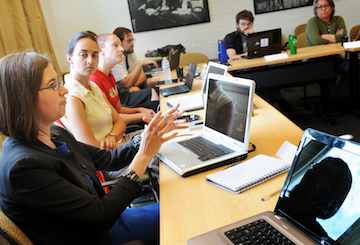In the past two weeks, I’ve been fortunate to be a part of CLIR’s annual Postdoctoral Fellowship Program summer seminar, held on the campus of Bryn Mawr College. As a former fellow (2004-2006, also at Bryn Mawr), then as co-leader of the seminar, and subsequently as a program officer, I’ve been involved in this program in one way or another throughout its nine-year history.
Begun as a way to bring technically adept subject specialists in the humanities into academic libraries, it has grown into a community of bright, eager scholars from the sciences, social sciences, and humanities, all seeking to make a positive impact in the rapidly evolving ecology of higher education while building careers in libraries, college and university departments, teaching and learning centers, research and data centers, and more.
We have always said the purpose of the summer seminar is to build a cohort–to create an environment in which new fellows can share their diverse expertise while focusing on the “big picture” issues in higher education: those issues that PhD training programs often take for granted or ignore. We look at the organization and preservation of library collections, the economics of scholarly publishing, staffing, professional and institutional cultures, and, critically, the ways that digital content, tools, and services are transforming all of them. Seminar discussions are heady experiences, at once invigorating and exhausting.
Just as I do every year, I leave the seminar convinced that this year’s new cohort has a special kind of brilliance. This is a group of energetic, open-minded, and thoughtful individuals who are unafraid to ask questions–often very difficult ones: How can we optimize our use of technology to help control the rising costs of higher education? Could the same resources help us better prepare primary and secondary students for higher learning? How can we develop effective and more sustainable strategies for research data curation, digital preservation, and the review and dissemination of scholarship?
Not only do our fellows ask these questions, the remarkable thing that we see at the seminar is their coming to accept responsibility for helping to find answers. The generosity of the prominent and gifted thinkers who visit us–some coming loyally year after year despite being impossibly busy people–inspires confidence in the fellows, but at the same time much of the growth that happens during the fellows’ “CLIR Camp” comes from their intellectual engagement with one another.
My theory is that the key to a successful seminar lies somewhere in the combination of a set of shared values–research, teaching, service, the preservation of our cultural and intellectual histories, and broad access to all–and a group of people with very different kinds of expertise. This is hardly a profound observation; after all, the best libraries exhibit the same dual sense of coherence and breadth. We strive to foster the same combination of convergence and heterogeneity in pretty much all that we do at CLIR.
Satisfying as our seminar may have been for me and (I hope) for our newest fellows, it strikes me that opportunities for deep engagement with others who have different kinds of training are still too few and far between for many of us in libraries and the academy. Our daily work requires us to stay current in our own narrow fields, leaving us without much time to reflect or to examine what we do from new perspectives. Where can we make space for these moments? Within our fellowship program I hope we can find ways to remind our fellows–all 88 of them, past and present–to make this space in their working lives. I also hope we can find ways to remain attentive to what has been rare and valuable in the fellowship experience as we grow.
We would welcome any thoughts or advice from those who are or who have been connected with the fellowship, or others. With our ten-year anniversary (!) approaching very fast and recruitment of our 2014 hosts and candidates set to begin any minute now, it is an opportune time to consider what impact the program may have had, what its significance to libraries and higher education might be, as well as what it might become in the future.

2013 University of Toronto fellow Alexandra Bolintineanu makes her point at the Postdoctoral Fellowship summer seminar, August 2, 2013 (Photo by Peter Tobia)

